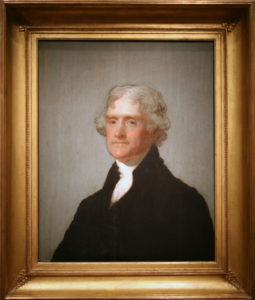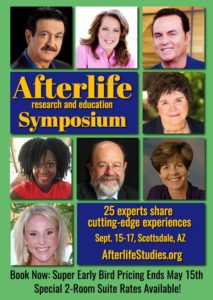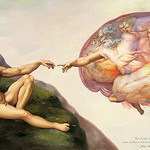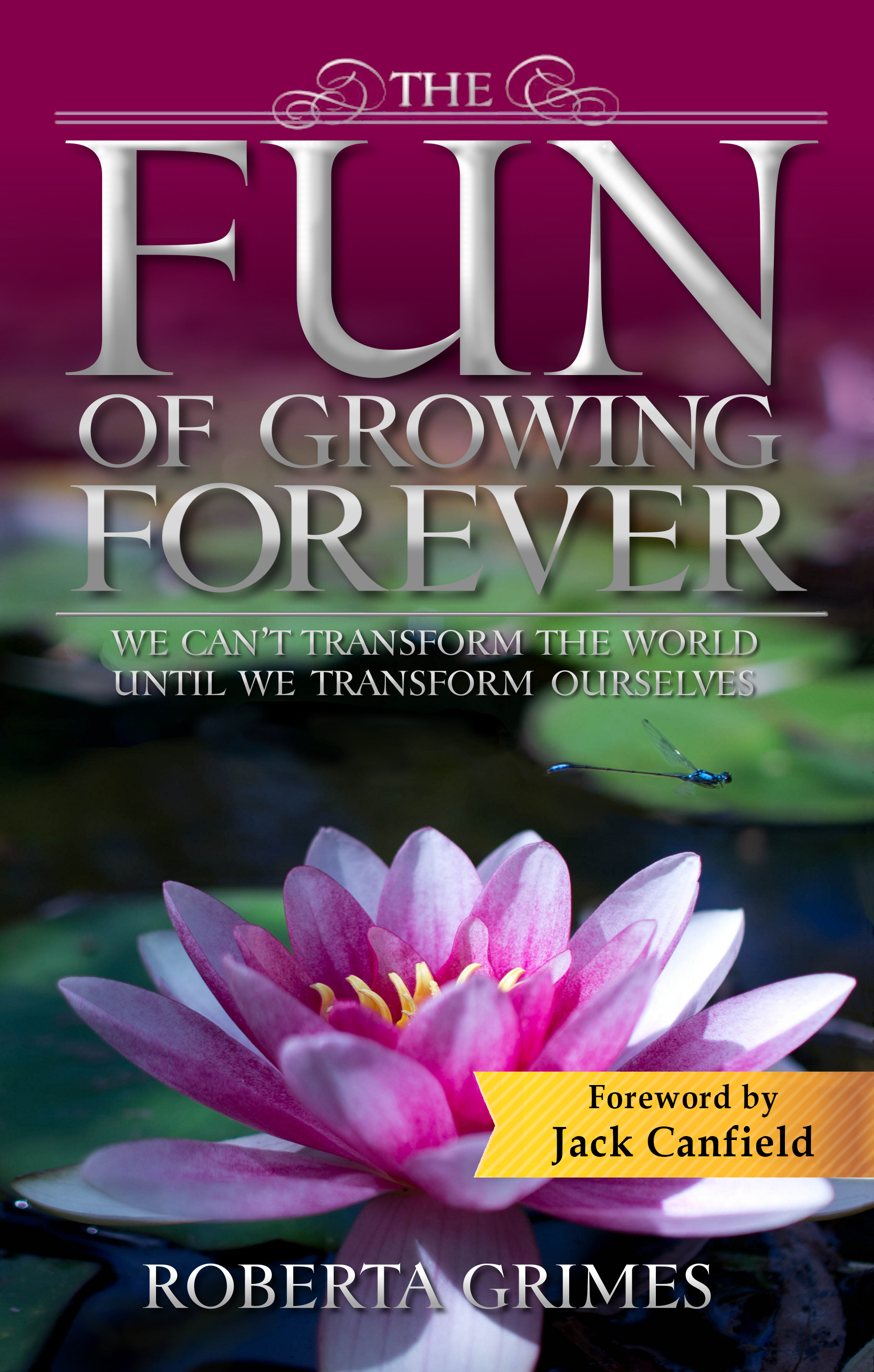 One of the most confounding things about studying the afterlife is getting our minds around the fact of reincarnation. And it is a fact. Much as I have tried not to think about it, given my traditional Christian background, the evidence is overwhelming and consistent that each of us lives many earth-lives. Jesus taught it, the dead affirm it, and those who are so inclined can undergo past-life regressions or future-life progressions and meet their own past or future selves.
One of the most confounding things about studying the afterlife is getting our minds around the fact of reincarnation. And it is a fact. Much as I have tried not to think about it, given my traditional Christian background, the evidence is overwhelming and consistent that each of us lives many earth-lives. Jesus taught it, the dead affirm it, and those who are so inclined can undergo past-life regressions or future-life progressions and meet their own past or future selves.
The actual mechanics of reincarnation are impossible for us to get our minds around while we are in earth-bodies. This is partly because while we are here we can consciously access perhaps as little as ten percent of our vast and powerful eternal minds; and partly because we still lack a deep understanding of the non-material realities. We are left to try to put a sense of it together, while knowing that what we envision isn’t likely to be quite what happens. You will see what I mean!
Here are eight important elements to aid you in thinking about reincarnation:
* Our minds are part of the infinitely loving eternal Mind which is all that exists. We are of the very stuff of God! And since that is the case, our eternal minds are more complex and powerful than our limited earth-minds can imagine.
 * Time is not objectively real. It exists only in this material universe, which is less than five percent of what even mainstream scientists know is real. Getting my mind around all that it means for time not actually to exist is for me the hardest part of this process.
* Time is not objectively real. It exists only in this material universe, which is less than five percent of what even mainstream scientists know is real. Getting my mind around all that it means for time not actually to exist is for me the hardest part of this process.
* Since there is no time, in most of reality there is only Now. Effectively, everything is happening at once, including every one of our lives and all of human history. This is a concept that is nearly impossible for most of us on earth to grasp!
* After each earth-lifetime, we spend as much non-time as we like in what some call the Summerland. It is earthlike, beautiful, quite literally heavenly. We take courses and lessons there, travel, enjoy family and friends, and generally relax for what seems to be an eternity.
* Family groups generally gather in the Summerland before anyone decides to reincarnate. So in nearly all cases, your relatives going back for a couple of generations will still be there when you arrive. And even if we reincarnate early, in some manner that we cannot understand apparently we leave a presence there.
* Periodically for most of us the craving for further spiritual growth becomes unbearable. We then plan and undertake another earth-lifetime in conjunction with our chosen guides and with those who will be important in that new lifetime.
* What seems to us to be our next lifetime might be in earth’s future or in  earth’s past! There truly is no time. We might surmise from the non-existence of time that past and future must be happening at once, but what is astonishing is that we can actually demonstrate this. Past-life regression therapists have found that it is just as easy to progress people to earth-lifetimes in this planet’s future as it is to take them into the past.
earth’s past! There truly is no time. We might surmise from the non-existence of time that past and future must be happening at once, but what is astonishing is that we can actually demonstrate this. Past-life regression therapists have found that it is just as easy to progress people to earth-lifetimes in this planet’s future as it is to take them into the past.
* Each of our lifetimes apparently is a separate existence that also is part of our vast eternal mind. It might be better to think of yourself as an enormous collective. And yes, each of those identities also is you! Each of your individual earth-lives contributes learning and attributes to the whole of your being. A very popular post-death activity is researching our most prominent past lives, although something that I don’t know is whether we also have access when in the Summerland to our lives that are being lived in the earth’s future.
All of our individual earth-lives seem to be recognizably related to one another, although we are not quite the same person in each lifetime. For example, my primary spirit guide, Thomas, once was Thomas Jefferson, and even before I ever met Thomas I knew the historical Jefferson pretty well. Thomas has a lot of Jefferson’s characteristics: both are intense and intellectually restless, profoundly honorable, and idealistic to a fault. But Jefferson had more of a soft side than Thomas seems to have. He was lighter and more optimistic. My Thomas, on the other hand, is a spiritual warrior more adamant and intractable than Jefferson ever was. He does not suffer fools! I can see that they are something like different aspects or views of the same person, and I find that really fascinating.
In 1960 Thomas Jefferson spoke through Leslie Flint, the great direct-voice medium. At the time, my Thomas was guiding a 14-year-old girl and likely bored out of his mind. Thomas was able to assume his Jeffersonian demeanor, and he even talked as Jefferson did in his old age (I was in his life then as a young male protege, and I recognize the voice in the Flint recording – what an amazing experience!). Everything Jefferson said through Leslie Flint, including his wish not to talk about his presidency and his advice about loving everyone and finding a way to end the cold war, all was presented in Thomas Jefferson’s characteristic gentle style. But every bit of it was just what my Thomas would have said!
medium. At the time, my Thomas was guiding a 14-year-old girl and likely bored out of his mind. Thomas was able to assume his Jeffersonian demeanor, and he even talked as Jefferson did in his old age (I was in his life then as a young male protege, and I recognize the voice in the Flint recording – what an amazing experience!). Everything Jefferson said through Leslie Flint, including his wish not to talk about his presidency and his advice about loving everyone and finding a way to end the cold war, all was presented in Thomas Jefferson’s characteristic gentle style. But every bit of it was just what my Thomas would have said!
This having heavily researched Thomas Jefferson, and now coming to know my Thomas so well, has closed the reincarnation loop for me. Thomas says that he and I have shared seventeen lifetimes, and always in more or less the same roles: he was a warrior for truth, while I (nearly always a male, incidentally) variously assisted him in that effort. I still don’t really get reincarnation, but this much I know to my core to be true.
Each of us is one vast and powerful mind that takes on many earth-lifetimes with various aspects of ourselves as we learn and grow spiritually. Just as the little child grows and changes but is always an aspect of the adult that he becomes, so each of those lifetimes is loved by us and familiar to us but is seen by us once we graduate to be only one aspect of our glorious eternal selves!
 t astonishes me now to realize that I met Craig Hogan just in 2009, and Susanne Wilson and the Zammits in 2014. For decades my obsessive hobby of investigating the afterlife was a lonely slog, with no colleagues and with no one in my life who even cared about what I was learning. I had known about Victor Zammit since the nineties, but he lived in Australia. Before the Internet, how useful was that?
t astonishes me now to realize that I met Craig Hogan just in 2009, and Susanne Wilson and the Zammits in 2014. For decades my obsessive hobby of investigating the afterlife was a lonely slog, with no colleagues and with no one in my life who even cared about what I was learning. I had known about Victor Zammit since the nineties, but he lived in Australia. Before the Internet, how useful was that? also cutting-edge afterlife communications practices; the best methods for achieving rapid spiritual growth; new thinking about how best to manage the transition that is not really death; and what the dead tell us is the purpose of human life. All in beautiful Scottsdale, Arizona.
also cutting-edge afterlife communications practices; the best methods for achieving rapid spiritual growth; new thinking about how best to manage the transition that is not really death; and what the dead tell us is the purpose of human life. All in beautiful Scottsdale, Arizona.




















![Pageflex Persona [document: PRS0000038_00067]](https://robertagrimes.com/wp-content/uploads/2015/12/Liberating-Jesus-Metallic-Front-Cover-197x300.jpg)




















